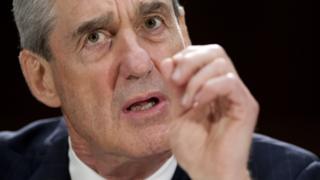What does the special counsel do?
A special counsel is in place to oversee the investigation looking into alleged Russian interference in the US presidential election, and if Trump campaign figures were complicit.
Robert Mueller, who headed the FBI for more than a decade, was appointed in May 2017.
But what is a special counsel? And what powers does he have?
Why was he appointed?
The special counsel was appointed by Rod Rosenstein, the deputy attorney general. He made the decision as “acting attorney general” because Attorney General Jeff Sessions had stepped aside from the Russia inquiry.
Mr Rosenstein said that given the “unique circumstances”, it was in the public interest for a special counsel independent “from the normal chain of command”, to lead the investigation.
By placing authority for the probe into the hands of Mr Mueller, the idea was that it would be able to proceed without any interference, including from the White House.
OK, but what is he actually looking at?
Mr Rosenstein’s order allows Mr Mueller to look into:
That last point gives him quite a broad remit, with observers suggesting that he will also determine if the president himself has committed any wrongdoing.
So far, his investigation has ventured into work done by former Trump advisers and Russian nationals. Thirty-four people have been charged with wrongdoing.
Read more
What powers does he have?
The special counsel has the powers of a US attorney – meaning he can subpoena records and bring criminal charges. And he has done so.
He can also prosecute anyone who interferes in his investigation through crimes including perjury, obstruction of justice, destruction of evidence, and intimidation of witnesses.
The special counsel can also ask for his jurisdiction to be widened.
He is not supervised on a day-to-day basis but the attorney general, or in this case Mr Rosenstein, is able to request an explanation for “any investigative or prosecutorial step” and can decide that any such action does not need to go ahead.
He must notify Congress if such a decision is made.
Who works for him?
The justice department has provided staff that can work for Mr Mueller, and he can also ask for specific people from both inside and outside the department.
He is reported to have hired at least 17 federal prosecutors, including experts in money laundering, fraud, foreign bribery and organised crime.
Who can get rid of him?
The new attorney general is Bill Barr, who replaced Jeff Sessions after the former Alabama senator was fired.
Mr Barr can fire the special counsel for the following reasons: misconduct, dereliction of duty, incapacity, conflict of interest or for other “good cause”, including violation of department policies.
Will the public get to read his report?
Not necessarily. When a special counsel’s work ends, a confidential report must be provided to the attorney general.
He then has to notify Congress and can decide if the report should be made public.
When pressed during his confirmation hearing about how much he would release to Congress, Mr Barr was non-committal.
Democrats on key committees have said they would use subpoena powers if necessary to obtain access to the report.
What’s the difference between a special counsel and a special prosecutor?
The term “special prosecutor'” in the US context harks back to the Watergate scandal, when President Nixon’s attorney general appointed Archibald Cox to lead an independent investigation.
But there was actually no law defining and regulating such an appointment, which allowed Mr Nixon to later fire Mr Cox. Only later, in 1978, was the Ethics in Government Act passed, which defined the circumstances under which an “independent counsel” could be appointed.
This role actually had more independence from the attorney general than the current special counsel position.
But the legal provision regulating it was allowed to expire in 1999 after the controversy of independent counsel Kenneth Starr’s wide-ranging investigation into President Bill Clinton, which started as an inquiry into the Whitewater land deal allegations but ended up providing details of his sexual relationship with White House intern Monica Lewinsky.
So the titles “independent counsel” or “special prosecutor” no longer exist.
Instead the justice department has regulations allowing an outside “special counsel” to be appointed to investigate a person or matter when it might present a conflict of interest for the department or under other “extraordinary circumstances”.
Source: Read Full Article



